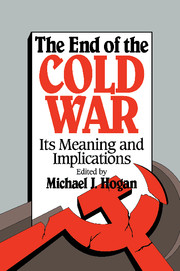Book contents
- Frontmatter
- Contents
- Preface
- The Authors
- Dedication
- 1 Introduction
- 2 An End to Which Cold War?
- 3 The Cold War, the Long Peace, and the Future
- 4 Quiet Cataclysm: Some Afterthoughts on World War III
- 5 Some Lessons from the Cold War
- 6 Nuclear Weapons and European Security during the Cold War
- 7 Victory in the Postwar Era: Despite the Cold War or Because of It?
- 8 The Wicked Witch of the West is Dead. Long Live the Wicked Witch of the East
- 9 The End and the Begining
- 10 A Balance Sheet: Lippmann, Kennan, and the Cold War
- 11 Why Did the Cold War Arise, and Why Did It End?
- 12 A View from Below
- 13 The End of the Cold War and the Middle East
- 14 The End of the Cold War in the Near East: What It Means for Historians and Policy Planners
- 15 After the Cold War: The United States, Germany, and European Security
- 16 The End of the Cold War: A Skeptical View
- 17 The End of the Cold War, the New Role for Europe, and the Decline of the United States
- 18 The Fading of the Cold War—and the Demystification of Twentieth-Century Issues
- 19 The U.S. Government, a Legacy of the Cold War
- 20 Foreign Policy, Partisan Politics, and the End of the Cold War
- 21 Beyond Bipolarity in Space and Time
- 22 A Usable Past for the Future
- Selective Bibliography
- Index
10 - A Balance Sheet: Lippmann, Kennan, and the Cold War
Published online by Cambridge University Press: 18 December 2009
- Frontmatter
- Contents
- Preface
- The Authors
- Dedication
- 1 Introduction
- 2 An End to Which Cold War?
- 3 The Cold War, the Long Peace, and the Future
- 4 Quiet Cataclysm: Some Afterthoughts on World War III
- 5 Some Lessons from the Cold War
- 6 Nuclear Weapons and European Security during the Cold War
- 7 Victory in the Postwar Era: Despite the Cold War or Because of It?
- 8 The Wicked Witch of the West is Dead. Long Live the Wicked Witch of the East
- 9 The End and the Begining
- 10 A Balance Sheet: Lippmann, Kennan, and the Cold War
- 11 Why Did the Cold War Arise, and Why Did It End?
- 12 A View from Below
- 13 The End of the Cold War and the Middle East
- 14 The End of the Cold War in the Near East: What It Means for Historians and Policy Planners
- 15 After the Cold War: The United States, Germany, and European Security
- 16 The End of the Cold War: A Skeptical View
- 17 The End of the Cold War, the New Role for Europe, and the Decline of the United States
- 18 The Fading of the Cold War—and the Demystification of Twentieth-Century Issues
- 19 The U.S. Government, a Legacy of the Cold War
- 20 Foreign Policy, Partisan Politics, and the End of the Cold War
- 21 Beyond Bipolarity in Space and Time
- 22 A Usable Past for the Future
- Selective Bibliography
- Index
Summary
Such reputations as present day pundits enjoy owe much to the fact that the newspaper columns they wrote forty-three days ago have already become recycled paper. Re-reading Walter Lippmann's columns on George Kennan's “X” article forty-three years after they were first published—in my case on the very day that the World War II conquerors relinquished their powers over Germany—is an unsettling experience. What are we to make of these twelve columns that Lippmann published a few months later as The Cold War? The clarity, the intellectual power, and the breadth of the analysis cannot fail to impress the reader, whatever one thinks of Lippmann's argument. As the United States stands on the threshold of another series of fateful choices, the contemporary relevance of the Lippmann-Kennan debate is striking.
The Cold War lays out a surprisingly coherent view of politics and diplomacy. It is a traditionalist, realist argument for a path not taken. Embedded in these columns and in Kennan's “Sources of Soviet Conduct” are many of the concerns that are likely to engage future historians of the Cold War. What was the Cold War? Was it inevitable? Could it have ended sooner? Is it reasonable to think that it could have ended differently under happier circumstances? (It is easy to imagine it ending under far worse.) What were the costs? Were any of them avoidable? It is most unlikely that these questions will ever be put to rest.
- Type
- Chapter
- Information
- The End of the Cold WarIts Meaning and Implications, pp. 113 - 126Publisher: Cambridge University PressPrint publication year: 1992



